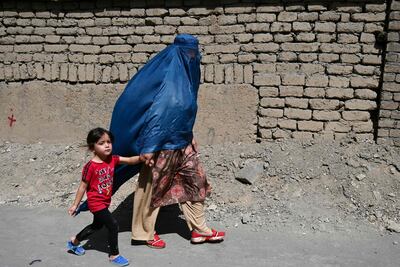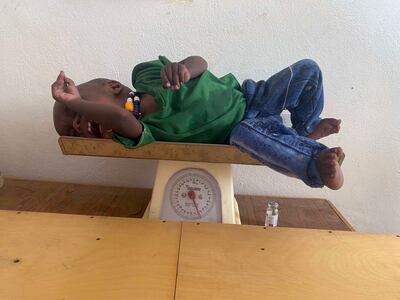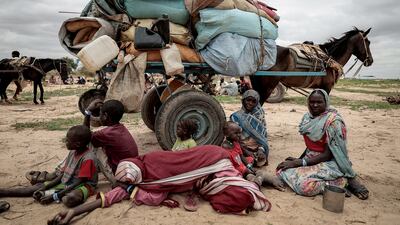The suffering of our times has many faces. An Afghan mother dies in childbirth every two hours. Injured families are brought to barely functioning hospitals daily in Gaza while grieving Israelis tattoo 7/10 on their skin as reminders of October’s deadly attack by Hamas. Fires rip through overcrowded Rohingya camps in Bangladesh destroying ramshackle refugee shelters. Ethiopia’s starving Tigrayans compete with birds to pick bits of grain from parched fields. Survivors of sexual violence in Darfur endure their pain in silence. West African migrants, desperate to reach Europe, disappear into the cold depths of the Atlantic. Traumatised Syrians shelter amid the rubble a year after a devastating earthquake.
Disabled Ukrainian children take refuge in a sanatorium when an incoming drone explodes nearby.
Each person suffers in their own way, regardless of the cause of their wounds. But the root of their suffering is the same. It is the inhumanity that accompanies the way we settle disputes. Egregious human rights abuses, war crimes and violations of international humanitarian law are normalised in armed conflicts today.

Driving this is the changed nature of wars. They are often endless because there are no settled winners, and losers refuse to acknowledge defeat. And so sieges and blockades are used to sap an adversary’s will by depriving them of food, water and medicine.
Such gambits – including so-called smart sanctions by the international community – are impossible to target accurately on fighters. They are skilled at avoidance through a combination of constructing profitable war economies, preying on trapped civilians as in Yemen and Sudan, or through downright criminality as in Haiti and Ecuador. Inevitably, the wider community is impoverished and punished, as seen earlier in Iraq.
When conflicts run out of heat, chronic instability follows, as in Afghanistan, South Sudan or the Congo. Suffering gets prolonged for decades, exacerbated further by paroxysms of acute violence. Many people around the world know nothing else from cradle to grave other than the struggle to survive. The emotional and mental toll carries down generations with grievances magnified along the way.
The collective punishment of populations thereby becomes both cause and consequence of repeated cycles of violence. It is then easily manipulated into a deliberate tool for making and sustaining wars. This is further encouraged by the multidimensional nature of modern conflicts fought from behind computers as much as with guns. Armed combatants and keyboard warriors as well as those who enable them, such as some social media cheerleaders, occupy the same space. When wars become whole-of-society affairs, distinguishing those who should or not benefit from the protections of the Geneva Conventions is difficult.
Surrounded by foes, real or imagined, military commanders who are understandably keen to minimise their own casualties get pushed towards "no quarters given" tactics, implying that combatants are not taken prisoner, but killed. Innocent people who are inadvertently caught in the crossfire stand little chance. Especially so in today’s highly urbanised conflicts – whether in Kharkiv or Khan Younis – where fighters and civilians, paramedics and teachers, humanitarians and activists, old and young, live cheek by jowl.
One myth of modern war is that it can be waged with precision. That may be true with limited special forces operations or particular drone strikes as, for example, claimed by America against Iran-backed militia in Syria and Iraq. But it is more usual for conflict zones to be characterised by chaos and confusion. Eliminating the opponent in such contexts becomes even more of a military imperative, leading to frustrated cries of genocide, as is evident in conflicts around the world.
Significantly, none of these tactics are new even if the means and methods have changed over the ages – inducing mass starvation, for example, which is war’s oldest weapon is used as much today, whether in Tigray and Gaza, or Ukraine in 1933. The western allies named their wartime encirclement of Japan “Operation Starvation” and it took the US until 2015 to renounce such tactics in its revised defence manual.

The long history of conflict is therefore a tale of refinement of the art of inflicting suffering and pain on opponents. Some evolutionary psychologists say that our fundamental survival instinct fosters this through boosting the social glue of one’s own group and dehumanising feared opponents. This starts with malevolent rhetoric, as seen during the 1994 Rwanda and 2003 Darfur genocides. That is why the mutually hateful language of some Hamas and Israeli leaders is worrisome. More widely, the weaponisation of identity is the leitmotif of current conflicts and ethnic cleansing accusations are common.
Making war is not illegitimate if there is just cause. But what is justified is usually contentious and causes yet more strife.
If wars continue and as they are almost always accompanied by the cruel streak in human make-up, do we give up on humanity? Not at all. We know this almost subconsciously because of the better angels of our nature and from the daily experiences of little kindnesses we receive and give.
All faiths recognise the eternal struggle between good and evil, and preach moral codes to limit the extent of warfare and mitigate the accompanying suffering. Appropriate prescriptions and prohibitions have long been codified in all cultures. They were globalised through the humanitarian values, principles, conventions, and institutions of the Red Cross Red Crescent and UN that reference a rules-based international order.
So, why are we doing so badly in terms of living up to humanitarian ideals during conflicts? This is reflected in the way that the humanitarian system is increasingly underfunded, bypassed, instrumentalised, distrusted and disrespected. It is dramatically illustrated by charges against the UN Relief and Works Agency (UNRWA) in Palestine or the UN Development Programme in Iraq, and World Food Programme in Ethiopia, among other examples.
Performance failings and agency misbehaviours explain some of the discontent. But organisational reforms are insufficient when more fundamental factors are at play.
The current one-size-fit-all global package of universal humanitarianism was a product of its post Second World War era. It glosses over legitimate differences between peoples. The humanitarian consensus that has prevailed for decades is unravelling due to shifting geopolitics that embolden questionable perspectives to come forth.
One implication of this is that while most can agree on what is wrong with our humanity, we cannot easily agree on the right way to heal it. That need not be problematic if we recognise that the many ways of doing good must be allowed expression in their own contexts. Freeing people to help each other in whatever way they can is our hope in a conflict-stricken world. It is the way to narrow the gap between human suffering and its relief.
Live updates: Follow the latest from Israel-Gaza


